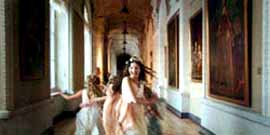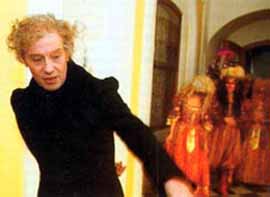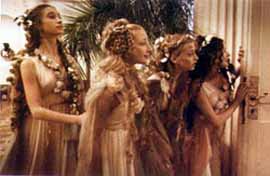|
| |
|

|
|
|
| july - september 2004 | focus on film 12 | |



|
| review |
|
||
| THE RUSSIAN ARK (Russkij Kovcheg) by Esteban Drincovich Russia-Germany, 2002. Directed by A. Sokurov. |
|
||
| Sokurov narrates the story of the Rooms of the Hermitage without interruptions in a 96-minute take with a voice in off, someone who talks with the foreigner, perhaps the spirit of the Hermitage. How strange. Where am I? Judging by my clothing, this must be the 1800s. You are in the former Imperial and current Hermitage National Museum. What if they don·t let us in? The palace was named “Hermitage”, French word that means “place where a hermit lives” and only guests of Catherine were allowed in. In 1852, during Nichols Pavlovich·s reign it was open to the public, but access was restricted. What city is this? It is Saint Petersburg. What city? Well, everyone speaks Russian. What language are we speaking? How strange! I·ve never spoken Russian. Can it be that I am invisible? Am I supposed to play a role? Well, actually, you are playing a role in a movie directed by Alexander Sokurov. It is an anachronistic journey, in which the constant concept is the reference to a visit to European Russia. What kind of game is this? Like Alfred Hitchcock in The Rope, Sokurov got the crazy idea of shooting the story of the rooms of the Hermitage in only one 96-minute sequence. Sokurov was unable to overcome the technical obstacle Hitchcock went up against, where no take could last longer than 10 minutes. Can all this be theater? Without a doubt, the actors had time to rehearse and each movement was studied in detail. I need to go to the bathroom! Do not be afraid, it is just Catherine the Great. I love the 18th century. Era of geniuses and manners. The museum is considered to have been created in 1764, the year when Catherine turned her private collection into a Museum, but only for palace and diplomatic life. Catherine was born in Germany, educated in France and had Russian ambitions and interests. Catherine definitely established the social and political regime that her predecessors had prepared, so much so that the subsequent Russia was molded mostly according to her ideas of society and State; she did not want her gallery to be surpassed by other monarchs· collections perhaps because of her desire to be looked upon as a learned despot. Russia is like a theater. Do you hear music? Russian music makes my ears pop. Russian music was subjected to the style imposed by Italians. Although the Russian people have always danced and sung, these demonstrations were never considered “refined art”. That music sounds good after all. Who composed it? Miguel Glinka. Who is that? Was he German? He was Russian. After having studied in Italy, he composed an opera based on Puchkin·s book “A life for the Czar”. This was the first expression of Russian musical nationalism and it paved the way for new generations: Balakirew, Cui, Borodin, Mussorgsky, Rimsky-Korsakow. No, he was certainly German. All composers are German. Puchkin, I·ve read it in French. He·s not special. This looks like the Vatican. Is that where we are? Was that decor inspired by the scenes of Rafael? Yes, Rafael. Better than the Vatican. This is Saint Petersburg. So, they·re copies? Your authorities don·t trust their own artists. The Russians are very talented copiers! Why? Because they don·t have their own ideas. In fact, they·re as lazy as all of you. The Czars were Russian, but sometimes even they dreamt about Italy. Canova! What an elevated approach to art! Canova almost married my mother. Was your mother a sculptress? Yes. In Rome. Why do you have this need to adopt European culture? Why? Was the Hermitage created to satisfy those dreams? Marques, look at "The Birth of John the Baptist". I know that painting. I saw it on my last visit here. It·s from Paris, from the Crozat collection. Catherine II bought it in 1772. It is one of the first pieces of the Hermitage collection. That information is for specialists. For us, the details are more interesting. Catherine II also bought The Virgin with Partridges by van Dyck. It feels like we are floating. It is as if all this were just a dream. The sea is everywhere. We are destined to sail forever. To Sokurov the Hermitage is the Russian Ark where art, history and the spirit are kept and preserved awaiting better times. The museum is closing. Please direct yourselves to the exit. |
|
||
| |
|||
|
magazine
|
gallery
|
guide
|
online projects
|
info
|
newsletter
|
contact us
|